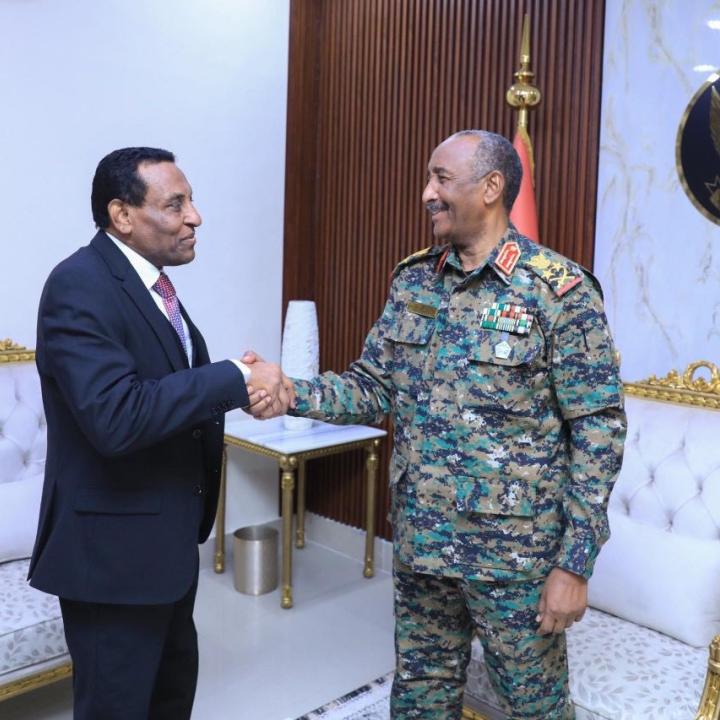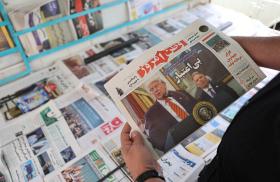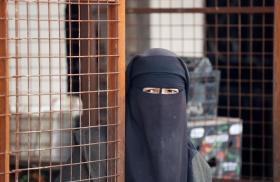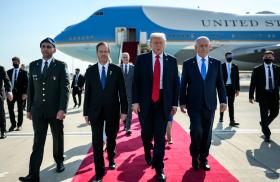
- Policy Analysis
- Fikra Forum
Kamil Idris and the Illusion of Civilian Leadership in Sudan

Sudan's new prime minister was recently appointed to present a civilian face palatable to the international community; whether he can implement reforms in Sudan's complex environment as promised in his recent speech will depend on international pressure and his ability to navigate the country's power dynamics.
"I will stand at an equal distance from all political forces, but I will eliminate this distance with the Sudanese people," "Together we can reach a national project," "I do not want to be a ruler over the people, but rather a servant to them."
These were some of the phrases that appeared in Kamil Idris's speech after his appointment as Prime Minister in Sudan, in which he attempted to paint a picture of his new role as a position close to the Sudanese street. The speech included generalized promises about sustainable development, fighting poverty and corruption, achieving national security, and serving the Sudanese citizen. Yet the optimistic tone that dominated the speech does not match Sudan’s reality: a critical and complex political moment layered on top of a tragedy controlled by guns and the logic of military force rather than civilian political rule.
In a country immersed in a years-long civil war and with deep social division, the decision to appointment Kamil Idris to the position of Prime Minister—empty since the previous Prime Minister resigned in 2022 and left the country’s military in full and open control of the country—reads as a calculated attempt to give a civilian sheen to the rough image of military authority. Nevertheless, this façade was forced on the regime by international pressure against it, demonstrating some responsiveness to outside expectations and opening a potential window of possibility—however slim—for Idris to implement real change in Sudan and make good on some of the promises envisioned in his speech.
Repeating the Legacy of Burhan’s Coup?
Whatever the rosy tone of this public messaging, the Sudanese public is likely to be skeptical of this new development given Sudan’s recent experience with the short tenure of Prime Minister Abdullah Hamdok. While Hamdok came to power on the wave of a massive popular movement that brought down longtime dictator Omar al-Bashir in 2019, by 2021 the Sudanese military led by General Abdel Fattah al-Burhan staged a coup—demonstrating that the institution of the Sudanese military does not easily give up the privileges of power in favor of any civilian component even if this component enjoys strong popular support and wide-ranging international backing. Without a radical and real transformation in the institutional and political balance of power, any civilian prime minister, regardless of his qualifications and popularity, remains vulnerable to exclusion and marginalization at some decisive moment determined by the military institution alone.
This dynamic extends back through Sudan's independence in 1956; since then, civilian democratic rule has neither been the norm nor the rule, appearing intermittently as a passing exception to the otherwise tight and continuous control of the military institution over all state apparatuses and decision-making centers. Over the past several decades, the country has witnessed a series of successive military coups that shaped the features of its turbulent political history: starting with General Ibrahim Abboud's coup in 1958 that overthrew the first democratic experience through the coup of October 25, 2021, when Burhan overthrew his civilian partner Abdullah Hamdok. Sudan's coup legacy is understood as a structural obstacle to any stable democratic project and emphasizes that the appointment of Dr. Kamil Idris is not necessarily a new development or sign of a new phase in Sudanese political history; many fear it is just part of the traditional mechanism of putting out a civilian facade without access to the essence of power.
International Pressures: The Real Motive for the Appointment
Yet unlike past cases, the appointment of a prime minister is not primarily motivated by internal factors. Burhan's latest coup left Sudan floundering in a constitutional and executive vacuum for more than three years, during which the army managed to tighten its grip on all the reins of political and military power until his military coalition fractured and escalated into civil war, leaving the structure of state institutions to collapse almost completely. Under these complex circumstances, the step of appointing Idris in April 2025 came as an attempt to break the internationally frozen political scene much more than as a real response to rising internal popular pressure or urgent mass demands.
The military institution's motives are therefore driven by necessities that include: breaking external isolation, avoiding escalating sanctions, presenting a civilian discourse to the international community after the recent victories achieved by the army in Khartoum, and buying additional time to arrange the house of power without making substantial concessions.
During this war, international obstacles have increasingly formed a major challenge to the army institution. This is especially the case with the U.S. Treasury Department imposing direct sanctions on Burhan in January 2025, including freezing his financial assets and preventing American institutions from dealings with him. In May 2025, Washington likewise announced the imposition of economic sanctions on the Sudanese government led by Burhan as Chairman of the Sovereignty Council after accusing it of using chemical weapons during military operations in 2024.
Why Kamil Idris Specifically?
With international pressure and political isolation worsening day by day, the Sudanese military institution found itself forced to find a civilian personality to present to the world but who would not pose a real threat to its hegemony over power. In this context, the choice of Kamil Idris is a calculated step; he possesses international credibility as the former Director-General of the World Intellectual Property Organization (WIPO) and has relationships in the corridors of the United Nations and international diplomacy. This background gives him a unique ability to address the international community using familiar and comfortable language: transparency, anti-corruption efforts, human rights, and good governance. The language he employed in his speech is known to be what Western capitals and donor institutions are looking for, and the military apparatus is happy for him to deploy it in order to cover a far different reality.
More importantly, Idris is institutionally ‘clean’; he does not belong to the Sudanese Muslim Brotherhood (al-Kizan) and is not directly connected to security or army institutions, making him externally acceptable and not arousing increasing sensitivity toward symbols of the previous regime or military personnel. Thus, he is an excellent choice to perform a specific function: reassuring the outside without threatening the inside.
Choosing Between Cosmetic Promises and Actual Change
Through a reading of the history of the military institution in Sudan that has become accustomed to coups and overthrowing any civilian attempt throughout the seventy years after independence, Sudan faces two scenarios with this new Prime Minister:
First Scenario: Idris remains a facade for military rule. The more likely and familiar scenario sees Kamel Idris remaining a "civilian cover" for a central military authority led by Burhan and his circle. Idris’s tasks will be limited in scope and restricted by clear red lines, confined to issuing studied official statements, diplomatic representation at international conferences, and directing reassuring messages to the international community. He will not possess real, effective decision-making powers nor the ability to form an independent sovereign government, and his movements will be confined within a narrow and carefully pre-calculated margin.
Second Scenario: A breakaway for Idris. While this is an optimistic and difficult-to-achieve alternative, the fragility of Sudan relative to past periods means that there may be room for Idris to emerge from the cloak of the military institution with calculated and gradual steps and implement actual change through a cohesive civilian project, even perhaps eventually providing room for a democratic process. In theory, the same international pressures that pushed Burhan to appoint Idris in the first place could also provide a window to pressure for the actual improvements these international voices seek. However, this transformation requires a set of complex conditions and circumstances that are rarely available in the Sudanese context:
- The existence of real regional and international support providing Idris with political cover and room for maneuver
- Idris himself possessing sufficient courage to confront forces opposed to any democratic transition
- The ability of a civilian Prime Minister to rebuild trust with civilian and societal forces burned by the short-lived democratic experience of 2019-2021
The Fundamental Obstacle of War
In light of the war’s escalation and the military’s grip on political and financial decision-making in Sudan, his appointment cannot be separated from the broader Sudanese context that is dominated by war priorities over everything else, where state resources are consumed to serve the war effort rather than development. While Kamil Idris is being presented as a civilian face for the military authority in Khartoum, parallel efforts are accelerating in areas under the control of the Rapid Support Forces (RSF) to form a rival government that likewise serves as a political cover for the RSF’s expansion and military project with direct backing from the RSF and its regional allies. If these parallel efforts continue without decisive intervention or the launch of an inclusive negotiation process, the prospects of secession and geographic and political fragmentation will be closer to a tangible threat to the existence of the Sudanese state and the unity of its national territory.
Moreover, Idris does not possess an organized party or influential popular base within Sudan, which means he lacks a political machine capable of mobilization and influence. This is a significant factor that makes Idris’s internal support tied to the army, so whoever supports the army will in turn support Idris. Unless these two issues are addressed, the second scenario of tangible change is impossible.
In the meantime, the international community—led by the United States—should not settle for facades and should focus its expectations on tangible changes in Sudan at the present time: facilitating aid delivery, protecting civilians, and beginning a comprehensive negotiation process led by the civilian prime minister. Without these steps, Idris's appointment will remain merely a cosmetic tool lacking legitimacy and credibility. With external pressure, Idris may be able to possess a rare opportunity granted only in pivotal moments if he has the leadership skills to grasp it.



